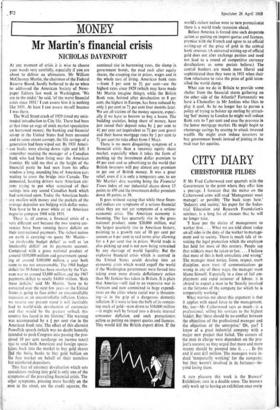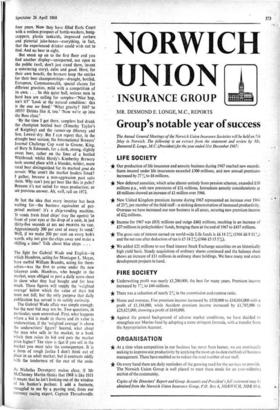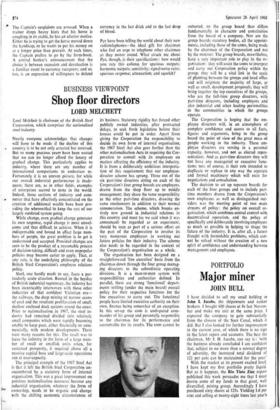CITY DIARY
CHRISTOPHER FILDES
If Mr Fred Catherwood ever quarrels with the Government to the point where they offer him a peerage, I forecast that the motto on the Catherwood arms will read 'Management must manage'; or possibly The buck stops here.' `Industry and society,' his paper for the Indus- trial Education and Research Foundation's seminar, is a long list of excuses that he will no longer take.
'I have put the duties of management to worker first. . . . What we are told about today- on all sides is the duty of the worker to manage- ment and to society. There is much talk of re- voking the legal protection which the employee has held for most of this century. People say that wildcats must be taken to law.... I believe that most of this is both unrealistic and wrong' The manager must notice, listen, respect, exert discipline, earn trust—if communications go wrong in any of these ways, the manager must blame himself. Especially in a time of full em- ployment and rapid turnover of labour, it is absurd to expect a man to be `heavily involved in the fortunes of the company for which he is temporarily working.'
What worries me about this argument is that it applies with equal force to the management. He, too—Mr Catherwood says as much—is a professional, selling his services to the highest bidder. But 'there should be no conflict between the objectives of the professional manager and the objectives of the enterprise.' Oh, yes? I know of a great industrial company with a major new project that failed. The careers of the men in charge were dependent on the pro- ject's success; so they urged that more and more money should be pumped into it. . . . In the end it cost £13 million. The managers were in- deed 'temporarily working' for the company; but they weren't involved in its fortunes—be- yond losing them.
A rare pleasure this week is the Brewers' Exhibition; rare in a double sense. The brewers only work up to having an exhibition once every four years. Now they have filled Earls Court with a restless prospect of bottle-washers, bung- stoppers, plastic tankards, improved corkers and pictorial juke-boxes—everything, in fact, that the experienced drinker could wish not to find. And no beer in sight.
But sneak up on to the first floor and you find another display—unreported, not open to the public (well, don't just stand there, invent a' convincing story), cairn and good. Here, for their own benefit, the brewers keep the entries for their beer championships—draught, bottled, European, Commonwealth, special classes for different gravities, mild with a_competition of its own. . . . In this quiet hall, serious men in hard hats are calling for samples—'Nice hop, isn't it?' Look at the-.natural condition : this is the one we fined.' `What gravity? 1047 to 1055? Drinks like if, too.' Now we're up into the Bass class.'
''By the time I got there, samplers had drunk the champion bottled beer (Timothy Taylor's of Keighley) and the runner-up (Harvey and Son, Lewes) dry. But f can report that, in the draught beer section, the International Brewers' Journal Challenge Cup went to Greene, King, of Bury St Edmunds, for a dark, strong, slightly sweet beer, rather on the lines •of a bottled Whitbread; 'whilst Hardy's Kimberley Brewery took second place with a blonder, milder, more rural beer distinguished for its marked gout du terroir. Why aren't the market leaders listed? I gather, because a non-aggression pact suits them. Why can't you 'get beer like this in pubs? Because it's not suited for mass production; or see previous answer. Ah, well, roll on 1972.
At last the idea that every investor has been waiting for—the business equivalent of per- petual motion! it's a nip-vending machine. It vends fresh fried chips' (say the agents) 'in front of your eyes at the drop of a coin, in just thirty-five seconds at BIG BIG PROFITS TO YOU.. Approximately 200 per cent of every is vend' Well, if We make 200 per cent on every boh's worth, why not give the chips away and make a shilling a time? Talk about blue chips. . . .
The fight for Gabriel Wade and English—in which Hambros, acting for Montague L. Meyer, have outbid William Brandts, acting for them, selves—was the first to come under the new takeover code. Hambros, who bought in the market, were obliged to post a daily score-sheet to show what they had bought and for how much. These figures will supply the 'weighted average' below which the value of their bid must not fall; but the only purpose that daily publication has served is to satisfy curiosity.
The Gabriel Wade affair was simple enough; but the next bid may not be. Two questions, in particular, seem unresolved. First, what happens where a bid is made in shares and its value is underwritten, if the 'weighted average' is above the underwriters' figure? Second, what about the man who sells in the market, to a bank which then raises its bid and puts the market price higher? The view is that if you sell in the market you must take the consequences. It is a form of rough justice I don't think out of place in an adult market; but it contrasts oddly with the tenderness of the rest of the code.
As Nicholas Davenport makes clear, if Mr McChesney Martin thinks that 1968 is like 1931 it means that he isn't looking out of the window of his banker's parlour. I add a footnote, smuggled to me by a passing tout, from our currency racing expert, Captain Threadneedle.
The Captain's suspicions are aroused. When a trainer drops heavy hints that his horse is coughing in its stable, he has an ulterior motive. Either he is trying to get the horse moved down the handicap, or he wants to put his money on at a longer price than prevails. At such times, the Captain prefers to go by the form-book. A central banker's announcement that the choice is between recession and devaluation is a familiar event to currency racegoers; and so, too, is an expression of willingness to defend Currency in the last ditch and to the last drop of blood.
Pye have been telling the world about their new radiotelephones—the ideal gift for chairmen who feel an urge to telephone other chairmen as they motor round. What struck me about Pye, though, is their specifications: how would you rate this column for spurious outputs; harmonic outputs; sensitivity; signal-noise ratio; spurious response; attenuation; and squelch?








































 Previous page
Previous page